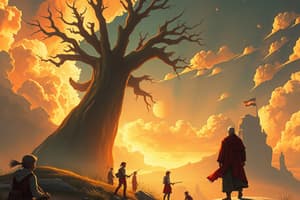Podcast
Questions and Answers
What is culture defined as?
What is culture defined as?
- The system of knowledge, norms, and values shared by members of a society (correct)
- The art of government
- Public affairs
- Routinized by cultural practices
Which discipline portrays social life as constantly enmeshed with power relations?
Which discipline portrays social life as constantly enmeshed with power relations?
- Political Science (correct)
- Sociology
- Psychology
- Anthropology
What is society defined as?
What is society defined as?
- A system of values and beliefs
- A group of people who interact in a defined territory and share a culture (correct)
- A group of people who interact in cultural practices
- The compromise and consensus between individuals
What does the text say about culture, society, and politics?
What does the text say about culture, society, and politics?
Which concept is defined as 'the art of government' according to the text?
Which concept is defined as 'the art of government' according to the text?
What does the text suggest about the nature of change in the world?
What does the text suggest about the nature of change in the world?
What is the main difference between sex and gender?
What is the main difference between sex and gender?
What does the text say about gender roles?
What does the text say about gender roles?
How did the introduction of democracy by the Americans affect social stratification in the Philippines?
How did the introduction of democracy by the Americans affect social stratification in the Philippines?
What is the main purpose of social mobility?
What is the main purpose of social mobility?
Study Notes
Defining Culture, Society, and Politics
- Society involves social, cultural, and political realities.
- Social sciences, including sociology, anthropology, and political science, portray social life as influenced by social forces, cultural practices, and power relations.
Understanding Culture
- Culture is a system of knowledge, norms, and values shared by members of a particular society.
- Culture, society, and politics exist in the realm of ideas and thoughts and influence individual and collective lives.
Defining Politics
- Politics can be defined as the art of government, public affairs, compromise and consensus, and power.
Identity and Identity Formation
- Identity refers to the distinctive characteristic that defines an individual or is shared by those belonging to a particular group.
- Identities shape individual and group behavior as well as people's views about other people and society.
Cultural Variations and Social Differences
Gender and Gender Roles
- Gender refers to social, cultural, and psychological characteristics or traits related to males and females based on certain social contexts.
- Gender roles refer to attitudes and behaviors that society expects a person to exhibit based on their sex.
Socio-Economic Classes in the Philippines
- The Philippine society can be categorized into various socio-economic classes based on occupation, income, wealth, or power.
- The National Statistical Coordination Board (NSCB) divided the population into high-income, middle-income, and low-income classes:
- High-income Class: People earning an average of P200,000 a month, accounting for 1% of the population.
- Middle-income Class: People earning an average of P36,000 per month, consisting of professionals and small-scale entrepreneurs.
- Low-Income Class: People earning less than P10,000 a month, consisting of laborers and minimum wage earners.
Social Mobility
- Social mobility refers to the movement of people or families within or between different levels in society.
- Social mobility is possible through education or, in some cases, through marriage.
Studying That Suits You
Use AI to generate personalized quizzes and flashcards to suit your learning preferences.
Description
Test your knowledge on the key concepts of culture, society, and politics as discussed in Lesson 1 of the 1st semester Reviewer. Explore the social, cultural, and political aspects of society portrayed in social sciences like sociology, anthropology, and political science.




